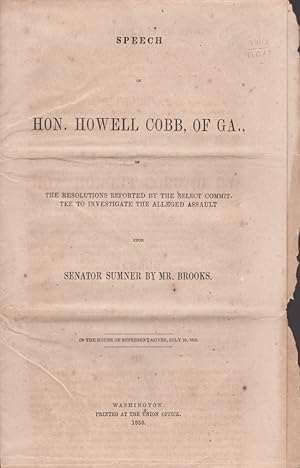Speech of Hon. Howell Cobb, of Ga., on The Resolutions Reported by the Select Committee to Investigate the Alleged Assault Upon Senator Sumner by Mr. Brooks, In the House of Representatives, July 10, 1856
Cobb, Hon. Howell
From
Americana Books, ABAA, Stone Mt, GA, U.S.A.
Seller rating 5 out of 5 stars
![]()
AbeBooks Seller since 20 July 2009
About this Item
Description:
Wraps. Uncut but folded 24" X 19" sheet of paper. 16 pages. Light edge wear and toning to paper. From wikipedia: The caning of Charles Sumner, or the Brooks Sumner Affair, occurred on May 22, 1856, in the United States Senate chamber, when Representative Preston Brooks, a pro-slavery Democrat from South Carolina, used a walking cane to attack Senator Charles Sumner, an abolitionist Republican from Massachusetts. The attack was in retaliation for an invective-laden speech given by Sumner two days earlier in which he fiercely criticized slaveholders, including pro-slavery South Carolina Senator Andrew Butler, a relative of Brooks. The beating nearly killed Sumner and contributed significantly to the country's polarization over the issue of slavery. It has been considered symbolic of the "breakdown of reasoned discourse"[1] and willingness to resort to violence that eventually led to the Civil War. Although Sumner was unable to return to the Senate until December 1859,[2] the Massachusetts legislature refused to replace him, leaving his empty desk in the Senate as a public reminder of the attack. Seller Inventory # 29006
Bibliographic Details
Title: Speech of Hon. Howell Cobb, of Ga., on The ...
Publisher: Printed at the Union Office, Washington D.C.
Publication Date: 1856
Binding: Wraps
Condition: Good
Edition: First Edition.
Top Search Results from the AbeBooks Marketplace
Speech of Hon. Howell Cobb, of Ga., on The Resolutions Reported by the Select Committee to Investigate the Alleged Assault Upon Senator Sumner by Mr. Brooks, In the House of Representatives, July 10, 1856
Seller: Americana Books, ABAA, Stone Mt, GA, U.S.A.
Wraps. Condition: Good. First Edition. Wraps. Uncut, folded sheet of paper. 24" X 19" unfolded. 16 pages. Light edge wear and toning to paper. Good condition. From wikipedia: The caning of Charles Sumner, or the BrooksSumner Affair, occurred on May 22, 1856, in the United States Senate chamber, when Representative Preston Brooks, a pro-slavery Democrat from South Carolina, used a walking cane to attack Senator Charles Sumner, an abolitionist Republican from Massachusetts. The attack was in retaliation for an invective-laden speech given by Sumner two days earlier in which he fiercely criticized slaveholders, including pro-slavery South Carolina Senator Andrew Butler, a relative of Brooks. The beating nearly killed Sumner and contributed significantly to the country's polarization over the issue of slavery. It has been considered symbolic of the "breakdown of reasoned discourse"[1] and willingness to resort to violence that eventually led to the Civil War. Although Sumner was unable to return to the Senate until December 1859,[2] the Massachusetts legislature refused to replace him, leaving his empty desk in the Senate as a public reminder of the attack. Seller Inventory # 36094
Quantity: 1 available

